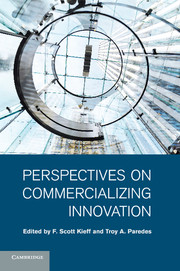Book contents
- Frontmatter
- Contents
- Contributors
- Dedication
- Acknowledgments
- Introduction
- Part I Perspectives on Theories of Intellectual Property
- 1 Intellectual Property and the Theory of the Firm
- 2 A Transactional View of Property Rights
- 3 The Modularity of Patent Law
- 4 Forging a New Environmental and Resource Economics Paradigm
- 5 Privatizing the Public Domain
- Part II Perspectives on the Problems of Anticommons and Patent Thickets
- Part III Perspectives on Finance and Commercialization
- Part IV Perspectives on the University Innovation
- Part V Perspectives on International Considerations
- Index
- References
3 - The Modularity of Patent Law
from Part I - Perspectives on Theories of Intellectual Property
Published online by Cambridge University Press: 05 December 2011
- Frontmatter
- Contents
- Contributors
- Dedication
- Acknowledgments
- Introduction
- Part I Perspectives on Theories of Intellectual Property
- 1 Intellectual Property and the Theory of the Firm
- 2 A Transactional View of Property Rights
- 3 The Modularity of Patent Law
- 4 Forging a New Environmental and Resource Economics Paradigm
- 5 Privatizing the Public Domain
- Part II Perspectives on the Problems of Anticommons and Patent Thickets
- Part III Perspectives on Finance and Commercialization
- Part IV Perspectives on the University Innovation
- Part V Perspectives on International Considerations
- Index
- References
Summary
At the core of controversies over the correct scope of intellectual property lie grave doubts about whether intellectual property is property. Property covers a broad range of resources, from solid objects like land and cars to fugitive resources like water to intangibles like debts. But, as a resource, information is different from all of these. From the consumer point of view, information is nonrival; one person's enjoyment of the plot of Hamlet does not diminish another's (if anything the opposite), and preventing people from using information – excluding them – is difficult. Although information itself is a public good and once known would be consumed at zero marginal cost, discovering and making information useful requires inputs that are rival and are susceptible to efforts to exclude. Edison's labor in testing filaments for the light bulb (not to mention his lab equipment and working space) were as rival and excludible as shrimp salads or Blackacre (the classic examples). On various theories, patent rights are said to give incentives to invent, develop, or commercialize information such as the light bulb. Other intellectual property rights regimes, such as copyright, focus more on creation, and yet others, like trademark, are concerned more with commercialization rather than creation. Yet all of these regimes reflect a concern that in their absence people will have too little incentive to engage in one or more activities with respect to information – from discovering it, to commercializing it, to using it to lower consumer search costs.
Intellectual property rights are conventionally said to solve an incentive problem – to create, to commercialize – but not an allocation problem. Regular property may serve to allocate resources to avoid use conflicts, but information can be used by more than one person – it is nonrival – and so need not be allocated to one person to the exclusion of another. Instead, intellectual property is supposed to encourage people to engage in the production or development of information. And if it is various activities we want to encourage, it would seem to follow that we should regulate or subsidize those activities. If there is an allocation problem connected with activities such as invention or commercialization, it involves not the information itself but the inputs used to discover and enhance the value of the information. But why we would provide for rights in information to solve this allocation problem when it would seem that we could simply give rights to appropriate the returns from these (rival) inputs like labor and lab space?
- Type
- Chapter
- Information
- Perspectives on Commercializing Innovation , pp. 83 - 116Publisher: Cambridge University PressPrint publication year: 2011



